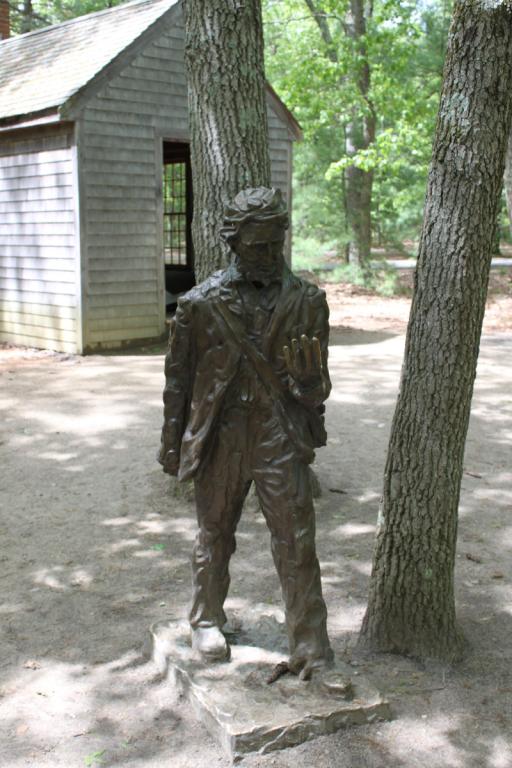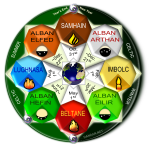
In discussing Henry David Thoreau, mid-20th century American writer E.B. White said “Walden is the report of a man torn by two powerful and opposing drives – the desire to enjoy the world and the urge to set the world straight.” I am no Thoreau, but that statement describes my current conundrum quite accurately.
I’m a Pagan in part because I see the world as something to enjoy. Our world is not fallen, it is becoming. Yes, life can be hard, and suffering is never far away, but there is so much to experience and so much to learn. There are the joys of love and friendship, the spiritual fulfillment of communion with the Gods and ancestors, and the intellectual fulfillment of discovery. I am not a Wiccan, but the charge to “sing, feast, dance, make music and love” is a beautiful recipe for making our time in this life simple and pleasant.
But I’m having a hard time singing these past few weeks.
Thousands of refugee children have come into our country and a substantial portion of our population wants to treat them like stray dogs.
Israelis and Palestinians keep killing each other. Israel is winning the body count and losing its soul, while the Palestinians persist in fighting a war they cannot win.
ISIL (I refuse to call them ISIS – may Auset strike them down) is trying to exterminate the Yazidis, force Christians to convert to Islam, and enforce barbaric laws they claim are “God’s will.” At least we’ve finally launched a few air strikes.
And here in the land of the free and the home of the brave, we’ve had yet another young, unarmed Black man killed by a police officer. Journalists have been arrested and peaceful protestors treated like criminals by a militarized police force more interested in showing how big and bad they are than in finding justice and preserving the peace.
I could go on. And on. And on.
It isn’t that bad things are happening in the world – there are always bad things happening in the world. And it isn’t that 24/7 news and social media make them impossible to ignore. I don’t want to ignore them – I want to do something to fix them. And I can’t.
I’ve never been accused of being an empath. I’m closer to being a sociopath, although I’m pretty sure I’m right in the middle of the empath-sociopath continuum. Perhaps it’s more self-centered paranoia than empathy, but here lately it’s been hard not to see myself in the victims, to realize that if things were just a bit different, that could be me hauled off to jail for not obeying a police officer’s arbitrary commands fast enough… or killed for worshipping different Gods.
I want to set the world straight. And if I can’t – and I know good and well that’s beyond the capacity of any individual, much less me – then at least I want to be able to work for justice. I want to use the relatively safe position of privilege I enjoy to advocate for solutions that are compassionate, fair, and most of all, effective.
But what am I supposed to advocate for?
There are no simple solutions, much less easy ones. Spiritual leaders with far more depth and speakers who are far more eloquent than me have implored those in power to embrace tolerance, compassion, and reason to no avail. Nobody has the right to tell people with legitimate grievances to just let it go and accept continued injustice. And some people simply can’t be bargained with – I’m reluctant to use the term “evil” but I can think of no other way to describe ISIL.
Thoreau was a strong advocate for the abolition of slavery, but he did not live to see its end. If Henry David Thoreau couldn’t set his world straight, what chance do any of us have with our far more complex world?
I do not know if our lives are controlled by fate or if we truly have free will. I have always argued we are better off ordering our lives as though we have free will because such a belief causes us to make better decisions. Yet at times like these the distinction seems meaningless – the wrongs of our world seem so large and so entrenched they might as well be fate.
For many of our ancestors, such a conundrum was simply The Way Things Are. They had little control and even less security in their lives. But this did not cause them to despair. While they certainly admired those who accomplished great things, they judged themselves based on how well they embodied the virtues and values of their people.
Not whether you won, but whether you fought valiantly.
Cú Chulainn is remembered as a great warrior, but he is also remembered as one who went bravely to his final battle knowing he had no strength for the fight.
In The Earth, The Gods and The Soul, Brendan Myers quotes the ancient Irish wisdom texts describing the qualities of a good ruler:
let him be merciful, just, impartial, conscientious, firm, generous, hospitable, honourable, stable, beneficent, capable, honest, well-spoken, steady, true judging
These are qualities all of us can embody regardless of our circumstances.
Two weeks ago I participated in a Rite of Herakles – you may know Him as Hercules. Herakles performed many great deeds but also suffered many great losses, including a painful and untimely death. But because of His perseverance and His willingness to do what was right no matter how difficult, the Gods raised him to Olympus.
I can’t set the world straight. I can live virtuously and encourage others to do the same. I can honor my Gods and ancestors and encourage others to do the same. I can fight the battles that come to me and support those who fight the battles I cannot.
And occasionally, I can sing and feast.













